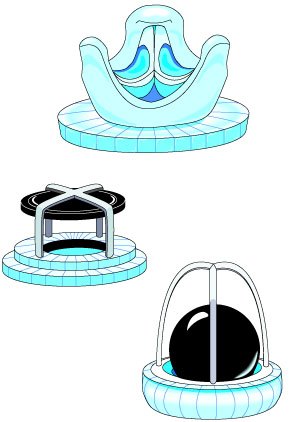Monday, November 2, 2009
why probiotics are necessary
why probiotics are necessary
Thursday, September 10, 2009
What is "Endocarditis"?
I have an artificial valve -- do I need to take blood thinners?
What is the best kind of artificial valve?
The need and ability to maintain long-term anticoagulation (blood thinning) is a very important factor. Several classes of people may not be good candidates to take warfarin (brand name coumadin), and therefore should receive a bioprosthetic valve. This group includes young women who wish to become pregnant. They should not take warfarin since it can frequently cause birth defects. Some people wish to continue to lead very, very active lives and taking a blood thinner would complicate the ability to do so. People who have had previous and sometimes repeated problems with bleeding (for example, frequent bleeding from ulcers) are often felt to be better served with the bioprosthetic valves which do not require anticoagulation.
On the other hand, for people who are going to need to have anticoagulation anyhow because they have the abnormal rhythm known as atrial fibrillation, using a bioprosthetic valve would have little advantage since they are going to need to take the blood thinner anyhow. They will most often receive a mechanical valve to take advantage of its longer life.
Another consideration for some people is the efficiency of the valve. That is, the replacement valve is never as good as the "real thing" in terms of how well it opens. Some artificial valves obstruct the flow of blood quite a bit, while others (mainly some of the bioprosthetic varieties) obstruct very little. There are some world-class athletes who compete despite having artificial valves, and they will have one of these "low profile" valves utilized to avoid loss of efficiency. This is generally not a consideration for most of us.
What kinds of artificial valves are there?

Mechanical valves. There are several different varieties, including "bileaflet tilting valves" which are extremely popular and reliable. Tilting single disc devices are also quite popular. Older models included the "caged-ball" device and "floating discs". The body does not recognize these as "foreign", and thus there is not a fear of rejection. Mechanical valves are generally felt to have the advantage of lasting the longest time. Their main disadvantage compared to other types of valves is the need to take potent blood thinners which decreases the tendency to form clots on their surface.
Bioprosthetic valves. These use some biologic material in their composition. They are all treated, and do not carry the risk of rejection. Treated aortic valves from human cadavers, treated pig aortic valves, and valves fashioned from the pericardium (the outside lining of the heart) of cows are all utilized. These types of valves do not necessarily require that the patient take blood-thinners, but generally do not last as long.
Please note that there are pictures of various valves below.
What kinds of surgery are available for problems with the Aortic Valve?
The Ross procedure. The Ross procedure utilizes the patient's own pulmonic valve for replacement into the aortic position.
Balloon aortic valvuloplasty. Balloon valvuloplasty of the aortic valve is an attractive technique for aortic stenosis since a large number of people with this problem are quite elderly and thus not ideal candidates for surgery. However, these same patients also typically have a heavily calcified aortic valve, and strokes secondary to loosening of this material can occur. Unfortunately, there is also a higher recurrence rate, with up to 80% of patients requiring repeat procedures within 6 months.